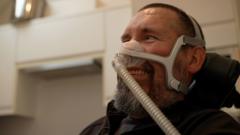On Friday, MPs began formal scrutiny of a bill that would allow terminally ill adults expected to die within six months to seek assistance in ending their own life. The day was marked by intense emotions and passionate debates both inside and outside of Parliament.
Early in the morning, campaigners gathered on opposite sides of Parliament Square. The pro-assisted dying group, wearing pink, included supporters like Amanda, who recalled caring for a friend with cancer who pleaded to be “killed.” On the other side, opponents assembled with a dramatic 10-foot puppet judge holding a giant syringe, chanting “Kill the bill, not the ill.”
Labour MP Kim Leadbeater, whose sister Jo Cox was assassinated in 2016, introduced the bill. Inside Parliament, the debate was contemplative and respectful, though tensions rose outside as campaigners passionately argued their positions.
Conservative MP Kit Malthouse delivered a powerful speech challenging arguments that the bill would burden the NHS and courts. “Are you seriously telling me that my death, my agony, is too much for the NHS to have time for?” he asked.
Sir Keir Starmer’s presence and implied support significantly influenced the vote. Many MPs were watching to see which way the political wind was blowing.
As voting concluded, the atmosphere in the Commons was notably silent. The bill passed, with supporters erupting in celebration outside. Pro-assisted dying campaigners shared emotional moments, with many thinking of deceased relatives who had suffered.
The opposing camp reacted with disappointment and concern. Anna was in tears, feeling a line had been crossed. Matthew, communicating through a tablet, worried about the potential devaluation of lives with disabilities, saying, “My friends deserve to live as much as anyone else.”
The vote was not unanimous – 270 MPs voted against the bill – but the passage represents a significant milestone in the ongoing debate about assisted dying.
Supporters celebrated with hugs and tears, understanding this was just the first step in a long parliamentary process. They emphasized the need to address concerns and continue dialogue.
The day was symbolically punctuated by the bells of St Margaret’s Church ringing – coincidentally for a wedding, but feeling meaningful to the pro-assisted dying campaigners.
The bill’s passage reflects a complex, emotional issue where compassion, personal experience, and ethical considerations intersect. While a historic moment for supporters, it also highlighted the deeply personal and divisive nature of the assisted dying debate.
Both sides shared a common ground of wanting to prevent unnecessary suffering, though they fundamentally disagreed on the best approach to achieving that goal.




